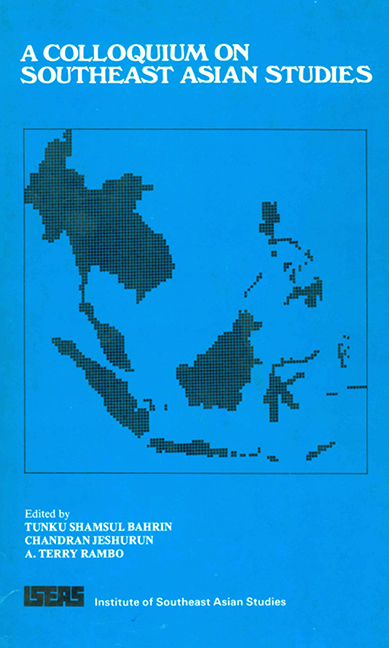Book contents
- Frontmatter
- Contents
- Foreword
- Preface
- Acknowledgements
- Introduction
- Contributors
- PART I TEACHING AND RESEARCH
- THE CONCEPTUAL THEORIES
- THE EXTRAREGIONAL EXPERIENCE
- THE REGIONAL PERSPECTIVE
- THE PROBLEMS OF TEACHING AND RESEARCH
- 13 Library Needs for Southeast Asian Studies
- 14 Promising but Reluctant: Southeast Asian Studies in Thailand
- PART II ENVIRONMENT AND DEVELOPMENT
13 - Library Needs for Southeast Asian Studies
from THE PROBLEMS OF TEACHING AND RESEARCH
Published online by Cambridge University Press: 21 October 2015
- Frontmatter
- Contents
- Foreword
- Preface
- Acknowledgements
- Introduction
- Contributors
- PART I TEACHING AND RESEARCH
- THE CONCEPTUAL THEORIES
- THE EXTRAREGIONAL EXPERIENCE
- THE REGIONAL PERSPECTIVE
- THE PROBLEMS OF TEACHING AND RESEARCH
- 13 Library Needs for Southeast Asian Studies
- 14 Promising but Reluctant: Southeast Asian Studies in Thailand
- PART II ENVIRONMENT AND DEVELOPMENT
Summary
It has been said that “every great library is the result of the joint endeavour of scholars and libraries”. Scholars should be involved in the development of the library's resources as much as librarians should be involved in the development of academic and research programmes.
A university or research library is a service unit and in order that it plays its role fully and conpetently it should be closely associated in the planning and development of academic programmes at every stage. The library's relationship to its parent institution must be one of support and response to growth and change. All new teaching and research place demands on the library in some way whether they take the form of new disciplines, new courses or new projects. The preliminary to any discussion about library needs for Southeast Asian Studies is therefore the nature of the Southeast Asian Studies programme itself — the way it is organized, the question of whether it would include postgraduate as well as undergraduate students, its general area of interest as well as its special emphases.
Library provision for Southeast Asian Studies began in North America where area studies have their genesis. With some notable exceptions, this has not taken the form of self-contained Southeast Asian collections. The publications are usually dispersed throughout the entire collection but often there would be a Southeast Asia Reading Room where current newspapers and journals and basic reference works can be found. The special attention to Southeast Asia has been provided instead in the appointment of a Southeast Asian Librarian or Bibliographer. This person would be responsible for developing the collection on Southeast Asia and assisting staff and students in utilizing its resources. Do Southeast Asian libraries need such a staff appointment and how do they cope with the problems of Southeast Asian acquisitions which form such an important part of his duties? Here we find the view from Southeast Asia somewhat different from that of North America or Western Europe.
- Type
- Chapter
- Information
- A Colloquium on Southeast Asian Studies , pp. 145 - 170Publisher: ISEAS–Yusof Ishak InstitutePrint publication year: 1981

